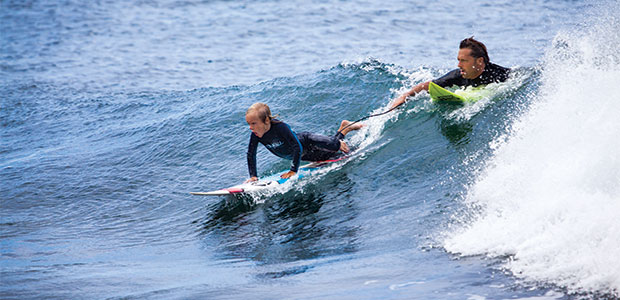
Getting a good start in life is important. Use these tips to equip your children with healthy habits that will last a lifetime.
Getting a good start in life is so important. Many health care professionals are very passionate about the immediacy of helping our children—now! As early as possible, guiding our children toward healthy lifestyle habits will help equip them to adapt to the rapidly changing challenges of today’s world.
Why healthy habits?
A habit is described as “a usual way of behaving; something that a person does often in a regular and repeated way.” This describes exactly how we can help our children get healthy, no matter where they find themselves today.
In the habit of moving
There are many reasons why healthy habits, especially the habit of engaging in regular physical activity, remain one of the most important practices we could nurture in our children. Interventions to reduce sedentary behaviours among children have demonstrated effectiveness in reducing body mass index (height-to-weight-ratio).
One at a time
Studies also indicate that changing one behaviour may be easier for children to accomplish than altering two or more behaviours at the same time. These findings offer invaluable direction toward getting our youth back on track, one habit at a time.
Why exercise?
Here are a few of the reasons why children should exercise.
- Children who exercise are more likely to be adults who exercise.
- Regular exercise is key to maintaining strong, healthy muscles, bones, and joints.
- Quality and quantity of sleep can be improved by exercise.
- Prevention or delay of chronic diseases, such as diabetes and hypertension, is possible with participation in regular physical activity.
Boning up
Yes, regular physical activity will grow healthy bones, as research continues to reveal. The results from certain studies on school-aged children indicate that as little as 10 minutes of moderate- to high-impact activities performed two or three days a week resulted in increased bone mineral density when combined with general weight-bearing aerobic activities. These activities, including jogging and playing, are also helpful in reducing risk factors for cardiovascular disease and obesity.
Out of the habit of sitting
Studies find that the amount of sedentary time, independent of other risk factors, can contribute to childhood obesity. In a recent meta-analysis of studies, researchers found that more than two hours per day of sedentary behaviour (primarily as TV viewing) “was associated with unfavourable body composition, decreased fitness, lowered self-esteem, and decreased academic achievement in children aged 5 to 17 years.”
Ontario-based naturopathic doctor and educator Alison Danby unreservedly states, “Increased use of electronics is clinically impacting our children’s overall health. Reduced physical activity and diminished quality of sleep are resulting in more children being diagnosed with adult-onset diseases. Research has demonstrated the importance and need of physical activity and proper sleep habits to develop bone mass and more importantly, to reduce risk factors for many chronic diseases.”
In the habit of sleeping
A sound sleep can give us freedom in so many areas of our being. A substantial body of evidence demonstrates that an appropriate level of sleep is essential to physical, cognitive, and emotional functioning.
Studies have also shown that children who have too little sleep may develop behavioural problems, including irritability and short attention span. It is also directly related to poorer school performance.
Children in their school-age years need help to learn good sleep habits. Sleep education is paramount during these years in providing children and their caregivers the knowledge and tools needed to prioritize sleep.
Out of the habit of being stressed
Stress is unavoidable. Our reaction to it, however, is a learned response. More and more, research is indicating the impact that early intervention of play and physical activity has on our children’s reactions to physical and psychological stress.
Ready to take on the world
Take, for instance, the 2012 Japanese study that examined 238 mothers and their preschool-aged children over the course of three months. These mothers were provided with play activities to be done at home for 10 minutes a day, five days a week. The results of this study demonstrated two key findings.
First, the children who played with their mother adapted better to the outside world as measured by their behaviour to explore, play, and learn. Second, the activity program used in this study was shown to enhance the children’s fluid intelligence (reasoning ability). From these results, it was proposed that parent-child play could both prevent psychological and psychiatric problems and improve children’s cognitive abilities.
Fit in mind and body
Another study, conducted out of the University of Buffalo in 2009, looked at the stress-reducing effects of interval exercise on 28 children between eight and 12 years of age. It confirmed findings of previous research that interval exercise reduces children’s heart rate and blood pressure reactivity to psychological stress. It also contributed new knowledge that suggests aerobic fitness may also positively change the heart rate in children undergoing psychological stress.
We can all agree with the wise prescription that “practice makes perfect, so be careful what you practice.” Our children’s future will be driven by habits we teach them today.
Solutions to limiting screen time
Helen Keller’s words can be applied as a solution to move our children out of the virtual world of technology and into the 3D world of the great outdoors: “Alone we can do so little; together we can do so much.”
Here are some other suggestions.
- Schedule electronic-free times, daily.
- Take advantage of free activities offered through your local library/community centre.
- Plan a walk for your children and their friends around your local farmers’ market.
- Kick off your shoes and enjoy family picnic dates by the lake.
- Swing in a hammock—experience the feeling!
- Reach out and organize neighbourhood event nights for fun-filled pick-up soccer games or bocce ball.





